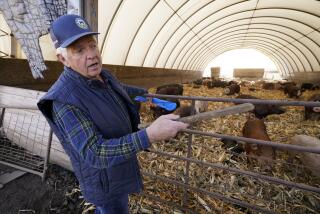CalPERS Blasts Safeway Decision to Retain Burd
- Share via
The nation’s largest public pension fund blasted Monday the decision by Safeway Inc. to replace three directors but retain Chief Executive Steven Burd as chairman, urging the grocer to dump Burd from the board and the company.
Safeway, owner of the Vons and Pavilions supermarket chains, announced its actions Monday in response to complaints by the California Public Employees’ Retirement System and four other public funds that also are major Safeway investors. They say the board lacks independence and is responsible for the company’s poor performance and lagging stock price over the last three years.
The funds, notably CalPERS, said Safeway’s moves did not go far enough.
“Safeway’s actions are a thinly veiled attempt to mollify share owners,” Rob Feckner, head of CalPERS’ investment committee, said in a statement.
He called the board change “a manipulative action to divert attention” from Safeway’s -- and Burd’s -- performance: “We have no reason to believe the future is any brighter with Burd still at the helm of this company.”
CalPERS isn’t interested in having Burd surrender the chairman’s post but remain CEO, as Michael Eisner recently did at Walt Disney Co. in response to investor pressure. “We want him out, completely out,” CalPERS spokesman Brad Pacheco said of Burd. “We don’t believe he’s the person to run this company in this kind of environment.”
Safeway spokesman Brian Dowling said other “major shareholders of Safeway have expressed support for Steve Burd and our company’s strategy.” He also said the funds’ overall comments were “an unfortunate reaction because these are very important and substantial governance steps.”
Burd, 54, is scheduled to hold a conference call with analysts today to announce fiscal first-quarter results, but it was unclear whether he would address the funds’ discontent. Safeway is expected to post another disappointing quarter, aggravated by the recent 4 1/2-month-long strike at stores in Central and Southern California.
Safeway shares closed down 17 cents Monday to $22.78 on the New York Stock Exchange. Three years ago, the stock traded above $60 a share. Safeway operates 1,817 stores, and its 2003 sales were $35.6 billion.
Pension funds and other critics have contended that close ties between several Safeway directors and the grocer helped breed poor management decisions, including failed acquisitions, that have led to Safeway’s problems.
But they also place the blame squarely on Burd, who made Safeway a star performer during the 1990s but has stumbled badly in recent years.
“I’ve said for a while that he was on shaky ground,” said Gary Giblen, research director at investment firm CL King & Associates in New York. Burd, he said, “probably has through this year to show substantially stronger results. If not, he’ll be out of the picture.”
The pension funds plan to protest the situation by withholding votes for Burd and two other directors -- William Tauscher and Robert MacDonnell -- at Safeway’s annual meeting May 20 at its Pleasanton, Calif., headquarters. Only they and Burd are up for reelection.
Besides CalPERS, the funds include the public pension funds in Illinois, Connecticut, New York state and New York City. Together they own about 7 million Safeway shares, or 2% of its common stock outstanding.
The non-CalPERS funds stopped short of saying whether Burd should leave the board or the company entirely, but said Safeway should take stronger steps to bolster its board’s independence. Burd has had “unchallenged influence over the company during this dramatic downturn,” the funds said. “He must be held accountable.”
The funds also have criticized Safeway’s decision to endure the long labor fight in California. Although the three chains won lower labor costs going forward, they also sustained millions of dollars in losses during the dispute and, the pension funds contended, damaged their long-term relationships with employees and customers.
Even so, the pension funds’ pressure in part reflects their sympathy for organized labor in the aftermath of the long California strike, Giblen said. “This is greatly driven by political grandstanding,” he said. “Their credibility would be enhanced if they had said ‘boo’ before now.”
Safeway said its board would replace directors George Roberts, James Green Jr. and Hector Ley Lopez by the end of this year.
The chain also named board member Paul Hazen, a former chairman of Wells Fargo & Co., as lead director. Safeway said Hazen would “create a balance” with Burd by, among other things, being a liaison between Burd and other independent directors.
Roberts and Green are partners at Kohlberg Kravis Roberts & Co., a leading corporate-buyout firm in New York. KKR acquired Safeway in a 1986 buyout, put Burd at the helm in the early 1990s, took Safeway public again and then sold the last of its Safeway stock by 2000.
But the pension funds say that Safeway’s board approved buying other KKR-controlled grocery chains that benefited KKR but not Safeway’s other investors, and that having Roberts and Green on the board was a conflict of interest.
More to Read
Inside the business of entertainment
The Wide Shot brings you news, analysis and insights on everything from streaming wars to production — and what it all means for the future.
You may occasionally receive promotional content from the Los Angeles Times.











